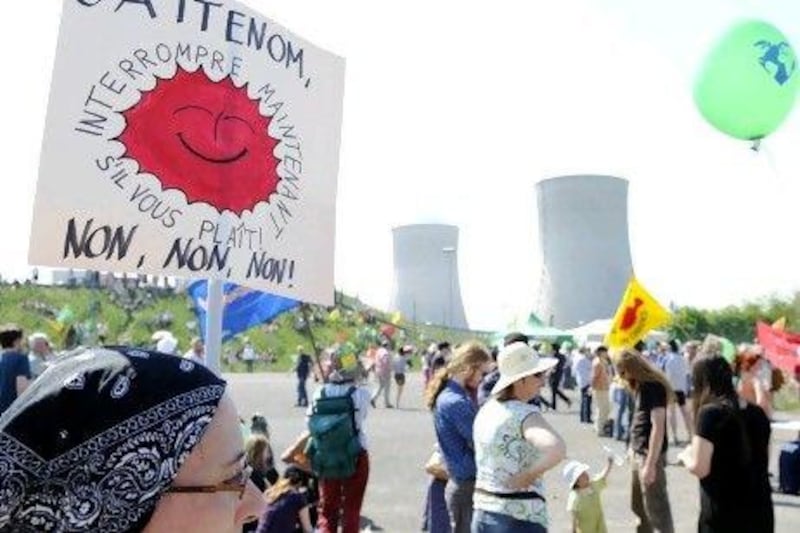LONDON // Rifts are developling in Europe over the future of nuclear energy after the Fukushima meltdown in Japan a year ago.
While some nations, including Germany, Italy and Switzerland, have decided to pull out of nuclear energy altogether, others - notably France, Britain and Poland - are pushing ahead with plans to construct new reactors.
Martin Schulz, the German president of the European parliament, warned on Tuesday that while choices over nuclear power rested with national governments, "we are all interconnected and all countries have neighbours".
There have even been proposals for a campaign later this year to force the EU to outlaw any new nuclear plant construction.
France is already at odds with both Germany and Luxembourg over what the Germans describe as the "enormous risk potential" of the four ageing reactors at Cattenom in Lorraine in northern France.
The French president Nicolas Sarkozy is resisting demands from his neighbours that the plant, which has the third-largest output of any in a country that gets about three-quarters of its energy from nuclear, be shut down. He points out that Cattenom was deemed "safe" by stress-tests ordered on 146 European reactors after Fukushima.
This has not satisfied Germany and Luxembourg. They maintain serious flaws remain at the plant, including its vulnerability to terrorist attack or a plane crash.
For its part, Germany immediately shut down eight of its oldest reactors in the aftermath of Fukushima and has undertaken to decommission the remaining nine plants by 2022 in what the nation's chancellor, Angela Merkel, has described as a "measured exit" from nuclear.
One result has been that Germany's carbon dioxide emissions have increased.
"The additional German emissions alone could add up to more than 300 million tons by 2020, which according to the World Nuclear Association, would virtually cancel out the 335 million-ton savings intended to be achieved in the entire European Union by the 2011 Energy Efficiency Directive," New Scientist magazine commented this month.
The Germans are relying on renewable energy, particularly wind and solar power where it is among the world leaders, to fill the energy gap. Others, such as Britain, believe that renewables and energy-conservation measures can only be part of the answer, particularly if carbon-emissions targets are to be met.
Last month, David Cameron, Britain's prime minister, and Mr Sarkozy signed a joint declaration for future Anglo-French cooperation on nuclear development.
Luis Echávarri, the director-general of the Paris-based Nuclear Energy Agency, a division of the Organization for Economic Co-operation and Development (OECD), believes that social pressures in different countries have much to do with differing attitudes towards nuclear energy.
The mass demonstrations in Germany against nuclear power after Fukushima simply did not happen in Britain or France, he noted.
"I think we have to take into account that the social situation of nuclear power in Germany has not been very good in the last 20 to 25 years. However, in France, there is a feeling in society that nuclear power is in the best interests of France," he said.
"There are a few countries - like Germany, Italy, Belgium, Switzerland - which have been very clearly saying that they are going to shut down some day their nuclear power plants and they are not going to construct more.
"But at the same time, there are many other countries which have stated that they are going to continue operating existing nuclear power plants and that, in addition, they are going to build more."
Globally, there has actually been an increase in the number of planned nuclear plants since Fukushima, with the total increasing from 163 from 156 in the past year. China is currently leading the way in the development of "fourth generation" reactors, which are considered far safer than the older water-cooled plants.
But European opponents of nuclear energy remain unmoved, and Werner Faymann, the Austrian chancellor, said last weekend that he expected the European Union to face a campaign for the phasing out of all reactors.
"The goal is a Europe-wide exit from nuclear energy," Mr. Faymann told the newspaper Österreich. "I expect the petition drive will start in at least six EU countries in autumn."
Such a move would be vehemently opposed by Ana Palacio, the former Spanish foreign minister and a senior vice president and general counsel at the World Bank.
"Today, with Europe increasingly seen as the sick man of the world's economy, even the whole continent's renunciation of nuclear energy would have little to no reverberation on the world stage," she commented in Turkey's Zaman newspaper this week.
"Perhaps the most striking contradiction in Europe's nuclear discourse is the discrepancy between the seeming effort to boost economic growth and employment, and the flippancy of member states in abandoning the nuclear industry, which depends on the design, engineering and command-and-control skills that underlie Europe's comparative advantage in the industry."






